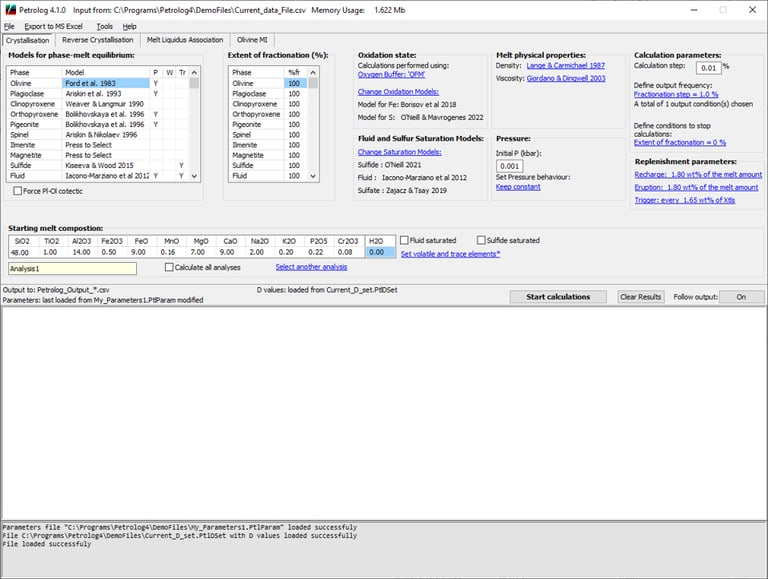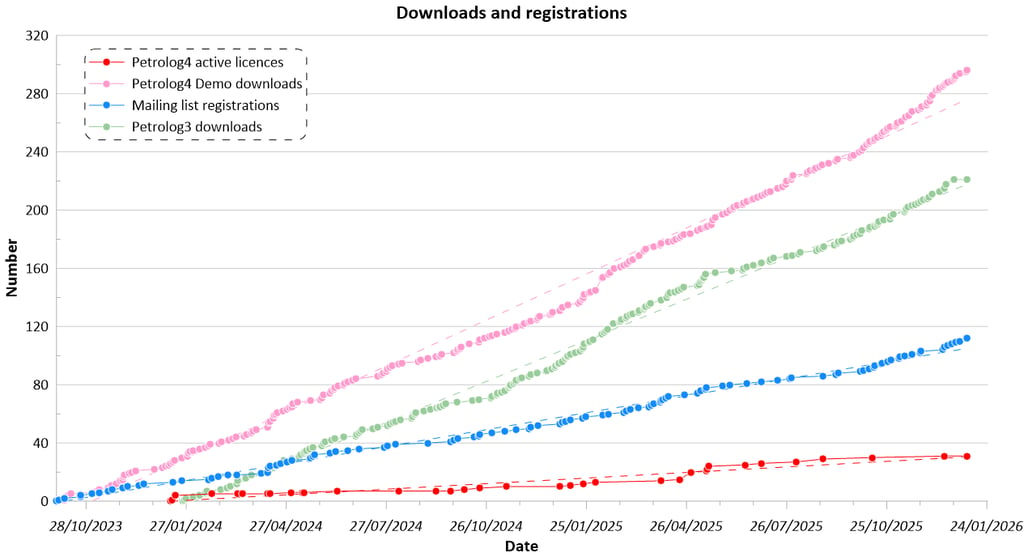Petrolog
Software for modelling magma crystallisation and melt inclusions


Download Petrolog4 (version 4.2.4)
31 active licences (07 January, 2026)
Download Petrolog4 Demo v.4.2.3
Need help?
email support@petrologsoftware.com
Main features of Petrolog
Petrolog4 is software for modelling fractional and equilibrium crystallisation of silicate magmas at variable pressure, melt oxidation state and melt volatile contents.
Other calculation options include modelling reverse of fractional crystallisation and modelling post-entrapment re-equilibration of melt inclusions in olivine.
Modelling of crystallisation in Petrolog4 is based on the concept of pseudo-liquidus temperatures (Nathan, Vankirk, 1978; Nielsen, Dungan, 1983; Ariskin et al., 1986). The method relies on the ability of the mineral-melt equilibrium models to calculate liquidus temperature not only for the range of melt compositions where the minerals are stable, but also for melt compositions outside the stability regions of each mineral (i.e., pseudo-liquidus temperatures).
The essence of the technique is to compare calculated pseudo-liquidus temperatures for a selected set of mineral species that may crystallize from a given melt composition. The mineral with the highest calculated temperature is considered the mineral on the liquidus of the given melt composition. This mineral is subtracted from melt, and then the process is repeated. The algorithm automatically determines the order of appearance of phases on the liquidus of the melt.
Additionally, Petrolog4 includes other phases for which phase-melt equilibrium models require that the temperature of the melt is independently known. Thus, including such phases in calculations requires that the liquidus temperature of the melt is established using appropriate mineral-melt equilibrium models described above.
Compositions of all phases during calculations are fully mass- and charge-balanced for all elements including O. This allows for maintaining redox equilibrium between silicate melt, sulphide melt and H2O-CO2 fluid using available models of melt oxidation state as a function of pressure, temperature and oxygen fugacity
Petrolog4 offers a model-independent algorithm (Danyushevsky, Plechov, 2011), which can incorporate a potentially unlimited number of phase-melt equilibrium models for major, volatile and trace elements; of solubility models in silicate melts for reduced and oxidised sulphur, fluid components and other elements; of melt oxidation state models; of models describing melt physical parameters such as density and viscosity; and other types of models.
- New feature in Petrolog4
Modelling equilibrium between H2O-CO2 fluid and silicate melt during magma evolution;
Modelling open and closed system degassing of H2O-CO2 fluid
during magma evolution;Modelling sulphide melt - silicate melt immiscibility
during magma evolution;Modelling redox equilibrium between Fe and S species
in the silicate meltModelling Fe oxidation state in the silicate melt as a function of melt composition, temperature and oxygen fugacity
Modelling S oxidation state in silicate melt
as a function of oxygen fugacityModelling S solubility in silicate melts as sulphide and sulphate
Modelling silicate melt recharge during magma evolution
Modelling crystallisation of 9 silicate minerals (olivine, plagioclase, clinopyroxene, orthopyroxene, pigeonite, quartz, orthoclase,
nepheline, leucite)Modelling crystallisation of 3 oxide minerals
(magnetite, spinel, ilmenite)Incorporating corrections for the effects of the H2O content
of the silicate melt and crystallisation pressure
on the liquidus temperatures of silicate and oxide mineralsVariable extent of fractionation of each phase during magma crystallisation
Modelling trace-element distribution between silicate melt and
other phases in the magmaWe recommend reading the manual and presentations for the full list of features
- New models in Petrolog4


